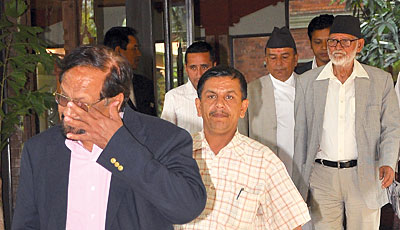 BIKRAM RAI |
Nepali politics has come full circle in the last year. In fact, we are back to square one. The protagonists have undergone a role reversal, but the hurdles that obstruct the process remain the same.
A year ago, the Maoists were against the CA extension. It said extending the CA 'as it is' had little relevance because that would neither facilitate a new constitution nor conclude the peace process. By 'as it is' the Maoists meant the existing political alignment between the UML-Nepali Congress and the Madhesi parties.
The Madhav Nepal government then had a solid backing from the NC and the Madhesi parties. But numerically, the coalition was still in a minority and needed Maoist support to extend the CA term. The Maoists had demanded the resignation of the Madhav government as a condition for extension. The CA session convened at midnight before the deadline expired and extended the CA term after Madhav Nepal finally promised to step down.
But the parties failed to form a consensus government even after Madhav Nepal's resignation. Instead, it took 17 rounds of elections in a severely divided house to elect Jhal Nath Khanal as prime minister. The Maoists and MJF (N) joined the government after their internal squabbles over the portfolios. The NC, bitter about its loss stayed out of the government.
So what has changed in the past year? The peace process is still in disarray and the CA deadline will expire in less than 48 hours after this paper goes to press. The NC with its alliance of fringe parties is refusing to extend the CA term 'as it is'. They are demanding the resignation of the Jhal Nath government as a precondition.
It is not surprising, therefore, that cynical politics has bred a cynical media. The op-ed headlines and comments from readers (including in this paper) indicate that political debate, like politics in Nepal, has reached an all time low. It has become more fashionable to reject or mock an idea that may or ought to change things for the better than to engage with the idea critically and come up with alternatives.
This may be because of the resentment and resignation the people feel towards the existing political culture. The disillusionment is manifested on the streets, in radio phone-ins and in the social networking sites. But this discontentment is being exploited by opportunistic and reactionary lobbies to convert it into political brownie points.
In New Baneswor, it is becoming difficult to identify pro-constitution lobbyists from anti-republic reactionaries, royalists from republicans. The alignment of the so-called 'democratic forces' with avowed anti-republicans inside the CA has muddied the scene to an extent that people are no longer sure who is sloganeering for what.
The government has come up with a 46-week calendar to justify a one-year extension. The calendar proposes 12 weeks for public opinion collection when even the door-to-door nationwide public opinion survey of 4,000 respondents by this paper last month was completed within a week. Four weeks to deliberate on the amendments and eight weeks to discuss them in the house is simply a waste of time. No wonder the government's proposal has been opposed by its own coalition members.
The CA and its members cannot hold the nation hostage for another year. If the government had charted out a 12-week time frame for completing the peace process then taking another 12 weeks to sort out contentious issues and come up with a workable constitution would have been more acceptable. We don't need a perfect constitution. It should be forward looking and flexible enough to incorporate people's aspirations even in the years to come.
As the deadline gets closer, it is becoming clearer that the drama in New Baneswor is less about the extension of the CA (make no mistake, everybody wants an extension) and more about the power sharing in its aftermath. The number game has begun. There are no winners yet in the political score-keeping, but it is clear if this drags on we will all be losers.
Read also:
The midnight hour, ANURAG ACHARYA
Point of no return, PROF. KRISHNA KHANAL
Feeling crabby?, RABI THAPA



